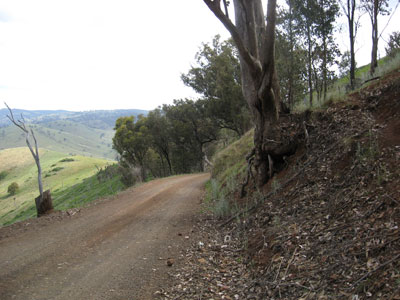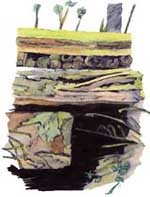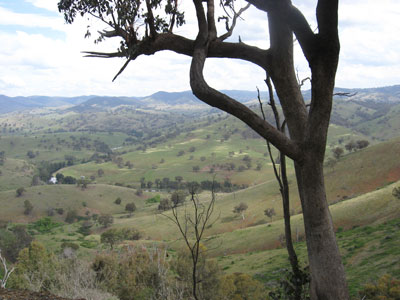FAIR GAME FOR EVERYONE
 In November 1997 I went looking for a special way into the Turon Valley in New South Wales. I had previously read that a road had been built by the Chinese in the nineteenth century and that many of those who came in search of gold had used it. The road runs from Cherry Tree Hill, crossed by the Mudgee Road, and is called the Razorback Road.
In November 1997 I went looking for a special way into the Turon Valley in New South Wales. I had previously read that a road had been built by the Chinese in the nineteenth century and that many of those who came in search of gold had used it. The road runs from Cherry Tree Hill, crossed by the Mudgee Road, and is called the Razorback Road.
The last narrow five or so kilometre steep descent into the valley affords the traveller spectacular views. The Turon River can be clearly seen as you descend. How the sight of that river must have revived those seekers of gold and drawn them on more hurriedly into the valley.
The discovery of gold brought many to the Turon Valley in the 1850s. The Turon River is a tributary of the Macquarie. Gold was discovered in May 1851 on the Turon River. During that year, 9 000 gold licences were issued on the Turon goldfield. It was to become New South Wales' most important goldfield, with the township of Sofala as its first centre.

Travelling into the Turon Valley along this Chinese-built roadway, I was reminded of an event which occurred on the river, many years previously. I had read of this event in Vicki Powys' fascinating history of the neighbouring area of Sunny Corner. In her book she included some reminiscences of Col Wilkinson. He moved to Sunny Corner with his family in 1918 or 1919, when he was three or four years old. In later life, at the age of seventy-four, he related to Plowys a story about a well-known local resident named Drysdale Scott.
Known to everyone as Dry Scott, he was then making his living carting with bullock teams. Wilkinson remembered him as being “fairly wild as a lad” and looking “a bit like one of his working bullocks and (he) must have been nearly as strong as one.” Once Scott went down to the Turon River to look for some of his horses which had gone missing. During his search he met a Chinese gold prospector who was working on the river.
What eventuated from this meeting, I made into a song which I called Just Fair Game.
The song's title, which features in the chorus, comes from a comment in Col Wilkinson's account:
“Chinese, in those days, did not rate very high on the citizenship scale and they were fair game for anyone.”

Wilkinson stated that Dry Scott was “just a lad” in the 1880's. He also claimed that at the time of Scott's meeting with the Chinese digger, “there were a lot of Chinamen working for gold on the river”. In the 1871 census, there had been 504 Chinese registered in the Sofala district. Ten years before, there had been more than double this number.
Small groups of Chinese apparently stayed in the district where they continued working both the Turon and Macquarie Rivers. The incident around which the song is based could therefore be dated somewhere in the late 1880's or early 1890's. Drysdale Scott went on to become a large landowner in the district. As to the future of the Chinese gold digger, nothing is known.
© 2001 Jim Low
View the Turon Valley Gallery for more images
![]() Read the lyric and listen to the song
Read the lyric and listen to the song
